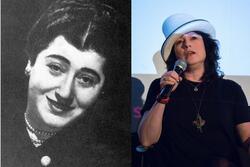The Surprising Jewishness of Avatar the Last Airbender
"If you look for the light, you will often find it. But if you look for the dark, that is all you will ever see" is a quote I think about every day. Like so many important life lessons, it came from Avatar: The Last Airbender's Uncle Iroh. Iroh teaches us to find honor, to be loyal to our friends, and not to stray from what matters most– but most importantly, he teaches that you are not alone.
The show Avatar: the Last Airbender (ATLA) is technically aimed at the six-to-ten year old set, but even though I have definitely aged past that, I still have found so much important meaning in the show, including a reflection of the Jewish experience and profound discussions of mental health. The story follows Aang, the Avatar (someone who can control all elements– earth, air, fire, water) on his journey to return peace to a war-torn world, which is composed of four regions, each having inhabitants that can control only one element. The four elemental nations are reminiscent of actual cultures: for example, the Fire Nation is based on Imperial Japan and the Water Tribes are based on Inuit culture. The Earth Kingdom capital of Ba Sing Se is based off of Beijing, and the Air Nomads are based on Tibetan Buddhism, according to the show’s creators. Yet I also feel that there are also a lot of similarities between the Air Nomads and the Jewish people.
The viewer's introduction to the Air Nomads holds a pretty obvious allegory. A main plot point of ATLA is that Avatar Aang is the last of the Air Nomads after he was frozen for 100 years. The reason for Aang’s solitude is that the Air Nomads suffered a mass genocide at the hands of the Fire Nation. I'm sure that I don't have to fully draw out why this is a parallel to the Jewish people for readers of this blog, and it is just one of many. In ATLA's sequel show (and the superior show in my opinion – sorry, I know that's controversial) The Legend of Korra, the Air Nomads begin to rebuild as many non-benders begin to discover their ability for airbending. These people come from all backgrounds and ethnic groups, and Air Culture begins to modernize and expand to hold all of these identities. The challenges of reconciling different identities that the new airbenders face perfectly encapsulates Jewish identity. As Jews, we are made up of many cultures, ethnic groups, geographic origins, and more. It is hard for us to define ourselves as a single culture, a single nation, a single religious experience, and a single ethnicity. Many of the new generation of airbenders also struggle to come to terms with their wide-ranging identities and to bond with other Nomads. In the end, they build a strong, beautiful culture, which is a feat after it was almost completely destroyed. And so did we.
No allegory for the Jewish people would be complete without a diaspora. And boy, do the Air Nomads have a diaspora. Pre-genocide, the Air Nomads’ society, though mobile, is centered around four air temples, where they live in a monastic organization reminiscent of Buddhism. However, after the temples are destroyed, they are displaced and live an even more nomadic life, traveling around the world to help people and rebuilding their temples. This is fairly similar to our own diaspora, as we, too, were dispersed throughout the world. The rebuilding of the Air Temples also feels familiar, almost as if airbenders make Aliyah by returning to the Temples. The Air Nomads' mission of helping others also reminds me a lot of our own mission of Tikkun Olam. The history and culture of the Air people obviously takes influence from many other cultures as well, but so does our history and culture, as we are influenced by ancient Egyptian, Babylonian, Persian, and Hellenic cultures, to name a few.
My identity as a Jew is not my only identity reflected in ATLA and The Legend of Korra. Avatar Korra, the Avatar after Aang, deals with challenges that are relatable to many women. For example, following a fight in which she almost died, Korra contends with mental health challenges that caused many people, mostly men, to doubt her. Instead of letting this control her thoughts and actions, she uses it as fuel to come back stronger. I always try to keep her in mind when I have a vulnerable moment. She demonstrates resilience even when people doubt you because of your gender. I see a lot of myself in Avatar Korra, and whether it's overcoming challenges related to spirituality or vulnerability, I feel comfortable knowing she has gone through similar experiences.
ATLA also portrays mental health struggles, and I personally feel the character that best exemplifies this is Azula. Azula is a character who was mostly neglected by her mother, causing her to go insane by the end of the show. Azula starts out as a perfect princess from the Fire Nation, but by the end of the third season, she has had hallucinations of her mother, attempted to kill her brother, and ostracized everyone close to her. Azula's arc is a dramatic representation of the pressure and stress of being a golden child, and while it’s set in a fantasy world, a lot of viewers do see themselves in her, as this pressure is a timeless issue. The stories of Korra and Azula’s mental health that ATLA and Korra show truly are relatable to many audiences.
Iroh's quintessential message that you are not alone is reflected for me by my identities being present in both ATLA and The Legend of Korra. Hopefully this show will help young kids take power and pride in their identities. These shows also represent many other identities, and many different types of people. It's impossible to be alone when you are surrounded by those like you, even if they exist on a kids’ show about flying buffalo.
This piece was written as part of JWA’s Rising Voices Fellowship.








So would you welcome a third series where the ruling class of Air Benders find themselves committing similar violent acts that The Fire Nation did to The Air Benders hundreds of years prior?
.
I'm not trolling or being facetious, but I'm genuinely curious. Jewish people are not a monolith, but the ruling class of Israel is committing similar violent acts upon Palestinians that the Nazis once did.
.
I think that a nuanced exploration on how they break the cycle of said violence, born through generational trauma would indeed be a perfect continuation of the Avatar franchise.
.
And I agree with you that Korra IS the superior show, because of its focused maturity and how Korra learns from and adopts certain viewpoints from every villain that she faces.
.
Imagine a generation past Korra that sees the Air Benders becoming the superior force in the world and subjugates the rest of the other Elemental Nations.
.
I can also argue that the Air Benders can also reflect the Native Americans, scattered across the land diminished, but keeping their culture alive and slowly rebuilding.
.
Same for the ancestors of enslaved Africans, who have rebuilt their culture though western culture, (ie: the tradition of Southern Baptists, is a melding of Christianity and the ritual of chants and dance from the African continent)
.
Seeing how the different Elemental Nations culture has evolved from The Last Airbender to their present day would be pretty cool to see 🙈 n the franchise.
I love this!